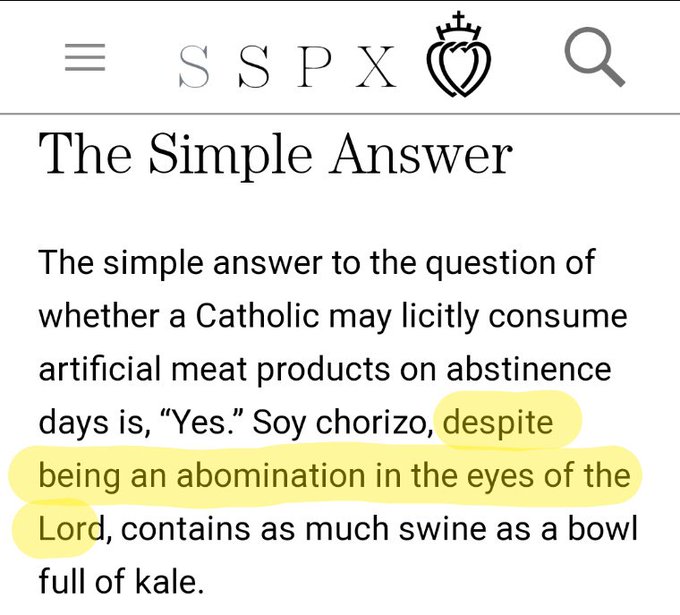On Ash Wednesday, Catholics and other Christians who observe Lenten fasting and abstinence face a new question: Is it alright to eat the meat-free Impossible Burger?
The Catholic Church requires its healthy adult members to abstain from meat on Ash Wednesday, Fridays during Lent, and select days during Holy Week, the week directly before Easter Sunday. Some Protestant denominations also recommend abstinence from meat during certain days in Lent. Orthodox churches expand the prohibitions on meat to include dairy products, eggs, oil, and wine, as well. The penitential practice is derived from Jesus Christ’s 40-day fast in the desert and is intended to help the faithful prepare their minds and bodies for Easter.
The Impossible Burger complicates the requirements for abstinence. Although it has all the appearances of meat, it is mostly composed of soy, potatoes, coconut oil, and a series of lab-created proteins to infuse it with beef flavoring. The meatless sandwich has been around since 2016 but did not become widely available until last August, when the fast-food chain Burger King rolled out the Impossible Whopper nationwide. Other fast-food chains have since introduced or tested meatless meat substitutes, including Denny’s, Dunkin’, and KFC.
This year, some restaurants are using the craze to announce Lenten specials on meat-flavored substitutes, the same way McDonald’s often offers deals on the Filet-O-Fish sandwich during the penitential season. Epic Burger, a Chicago-based burger chain, capitalized on Lent by sending out email promotions calling its meatless burgers “perfect for people who aren’t eating meat who want to indulge without feeling guilty.” Wayback Burgers, a Delaware-based burger chain, also has introduced plant-based meat substitutes “just in time for Lent.”
“Our guests who observe Lent have told us they’ve grown tired of fish and pizza as the only options on Friday nights, and for those craving meat, we now offer a Lent-friendly solution,” Wayback President Patrick Conlin told the Washington Times.
Some religious social media users have wondered if it’s alright to chow down.

The Society of Saint Pius X, a schismatic Catholic organization, published an explainer last November stating that it is not technically a violation of the rules of abstinence to eat meatless meats on the designated days.
More orthodox sources agree. Strictly speaking, the consumption of nonmeat options designed to imitate meat does not violate Lenten requirements, Thomas Petri, academic dean of the Dominican House of Studies, told the Washington Examiner.
“This is true whether one is speaking about bacon-flavored potato chips or Burger King’s Impossible Whopper,” he said. “However, I would propose that asking the question misses the point of the discipline, which is to offer up something delectable and desirous up as a form of penance in union with the suffering of Jesus Christ.”
Petri said that eating meat-flavored substitutes to “cheat the system” would preclude Catholics from receiving “any supernatural merit for doing so.” Petri added that Catholics should be “vigilant and mindful” of their intentions when abstaining from meat.
“If they desire to truly give up the delicious goodness of meat, I am confident that they will not worry about scrupulous details — they’ll simply avoid anything that hints of meat, whether artificial bacon bits or Impossible Whoppers,” he said.
The Vatican has not released any statement regarding the consumption of meatless meat during Lent. Pope Francis, however, has spoken about the importance of abstaining from meat by adhering to both the letter of the law and its spirit. Francis said during a 2015 homily that it was illegitimate to think in Lent, “Today is Friday, I can’t eat meat, but I’m going to have a nice plate of seafood, a real banquet.” The pope called that a sin of gluttony.
David Bentley Hart, an Orthodox theologian and translator of the New Testament, offered a slightly different opinion on abstinence. Hart told the Washington Examiner that, broadly speaking, the decision whether to eat the Impossible Burger should be determined “as conscience dictates.” But, Hart said, in this case, it is probably safer to follow the “letter of the law rather than its spirit.”
“Anyone can do just about anything and say that there was no violation of the ‘spirit’ of the law,” he said. “But, if one hews rigorously to the letter only, one can wander only so far and make only so many compromises with one’s conscience.”
For these reasons, Hart concluded that it is “probably fine to eat the vegetal simulacrum in place of the carnal original.” Hart pointed out, however, that for the most strict Orthodox observers, the Impossible Burger would not be allowed on days of abstinence, because it contains coconut oil.
“But very few are quite that punctilious in their observance,” he said.
